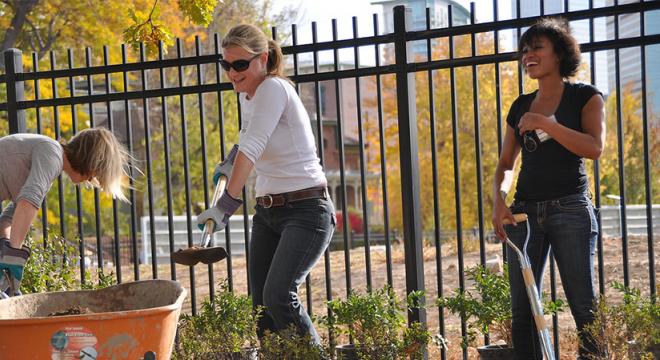April 19, 2017
Using Behavioral Science to Unleash the Power of Your Employees’ Everyday Actions
By Digney Eisner & Robb Johnstone
Climate change. It’s certainly one of the biggest issues facing the planet and us, the 7 billion people who share it. Yet it’s become clearer than ever that we can’t rely on governments alone to do something about it. It’s imperative that the private sector step up as a force for Good — and we’re encouraged to see that it is.
88% of millennials say their job is more fulfilling when they are provided opportunities to make a positive impact on social and environmental issues.
Many businesses are making strides with new sustainability initiatives and practices. From innovating greener production techniques to using sustainable energy sources, concerned companies are doing big things. Their leadership and achievements are to be applauded.
But there's another opportunity for companies to make a meaningful difference. They can play a part in inspiring and enabling the small, everyday actions of their people that will add up to big changes.
People are hungry for opportunities to give back and increasingly expect their employers to help them make a difference and bring more purpose to their work.
In fact, 88% of millennials say their job is more fulfilling when they are provided opportunities to make a positive impact on social and environmental issues. It’s time for businesses to start thinking small!
How do you do it? One can look to several Benevity clients who are using our software to power their “Goodness Programs,” from workplace giving and matching, to employee volunteering and community investment programs. These progressive companies are tackling the goals of employee engagement and environmental change at both the strategic and the grassroots levels.
For example, Hewlett Packard Enterprise has its own “Sustainability Network” that connects employees who are taking action to protect our planet through localized sustainability activities.
This includes annual Earth Day celebrations, on-site waste reduction events and community projects.
Expedia is incorporating the UN’s Sustainable Development Goal on climate action into their corporate strategy and executing it through their employee engagement initiatives. They’re providing vital leadership from a corporate level that filters down to grassroots action.
Harnessing the purpose-driven mindset of today’s employees with workplace engagement and giving is key. A unified, informed, and enabled workplace is a powerful force for good in this world.
And Agrium, a global supplier of agricultural products, is helping employees get involved in community-level projects like helping kids grow food gardens and a contest to imagine strategies to protect watersheds.
As Agrium's Director of Sustainability and Stakeholder Relations says, “The positive ripples from these projects can be seen locally and globally.”
At Benevity, we’re interested in providing ways for companies to inspire, track and reward their people for engaging in pro-social behaviors.
Whether it’s giving to a charity of one’s choice and having a match automatically applied or being rewarded for volunteering through donation currency that enables volunteers to direct those funds to any charity, engaging people in their passions in simple, easy-to-use ways yields greater participation.
And the same is true for environmental action. Behavioral science tells us that achieving engagement requires simplicity, personalization and rewards.
We have been testing a new project at Benevity that involves running daily polls asking Benevity-ites to record sustainable actions in their everyday lives — from cycling to work to taking shorter (colder!) showers to getting informed on environmental issues.
The project puts small actions at the top of mind, and the sense of teamwork — in seeing your team members’ contributions — is inspiring. A small step. But that’s what this is about.
Ultimately, inspiring these micro actions means modifying behaviors. That means understanding the different motivations individuals have for their behavior.
While some will get engaged for strictly altruistic reasons, others will do it for reasons of personal self-fulfillment. Some will get on board because they are career-minded, hoping their pro-social contributions will lead to recognition and advancement. And others get fired up by competition. They challenge themselves but they really get energized by combining their efforts with their colleagues (and if they connect as a team, all the better).
With this array of motivations in mind, here are a few ideas for using behavioral science to effect positive behaviors, all with the aim of driving authentic employee engagement:
● Make it simple, achievable and trackable
● Provide variety: be inclusive of the diverse skills, interests and strengths your people possess
● Make it fun: enable competitions, challenges and cross-functional team building
● Empower your employees to become champions for projects
● Offer rewards and recognition: let your people know your company sees and appreciates their contributions
Of course, the big benefit to inspiring and enabling small steps towards sustainability is making meaningful contributions to the environment.
Companies are recognizing and embracing the opportunity to weave together purpose at work, the UN Sustainable Development Goals (SDGs) and employee engagement to accelerate environmental progress. As EarthShare CEO Meri-Margaret Deoudes says, “Harnessing the purpose-driven mindset of today’s employees with workplace engagement and giving is key.
A unified, informed, and enabled workplace is a powerful force for good in this world.”
There are significant benefits to your business too. Companies that provide opportunities and outlets for their team members to make and be recognized for individual actions can expect big returns in employee engagement, increased loyalty and productivity.
And with almost 70% of the U.S. workforce not engaged, programs that support employee engagement aren’t just nice-to-haves — the success of your business depends on them.
For companies motivated to protect our planet and spur employee engagement, the great news is that 7 billion people making small steps adds up to powerful change.
See how Benevity helps the world’s most iconic brands engage their employees in Goodness.
 Robb Johnstone is a User Experience Designer at Benevity. Besides applying theories of behavioral science to real-life software user experiences, he’s helping shape the next generation of Benevity’s people-engagement products. A word nerd with a passion for content, Robb believes in the power of messaging to turn delight into action.
Robb Johnstone is a User Experience Designer at Benevity. Besides applying theories of behavioral science to real-life software user experiences, he’s helping shape the next generation of Benevity’s people-engagement products. A word nerd with a passion for content, Robb believes in the power of messaging to turn delight into action.
 Digney Eisner is a Relationship Manager at Benevity. He helps clients all over the world get the most out of Benevity’s cloud based employee giving, volunteering and granting solutions. He is inspired by companies who take innovative approaches towards Corporate Social Responsibility and Sustainability initiatives and loves seeing the positive impacts it can have on society.
Digney Eisner is a Relationship Manager at Benevity. He helps clients all over the world get the most out of Benevity’s cloud based employee giving, volunteering and granting solutions. He is inspired by companies who take innovative approaches towards Corporate Social Responsibility and Sustainability initiatives and loves seeing the positive impacts it can have on society.
Image courtesy of David A. Gross CC 2010

